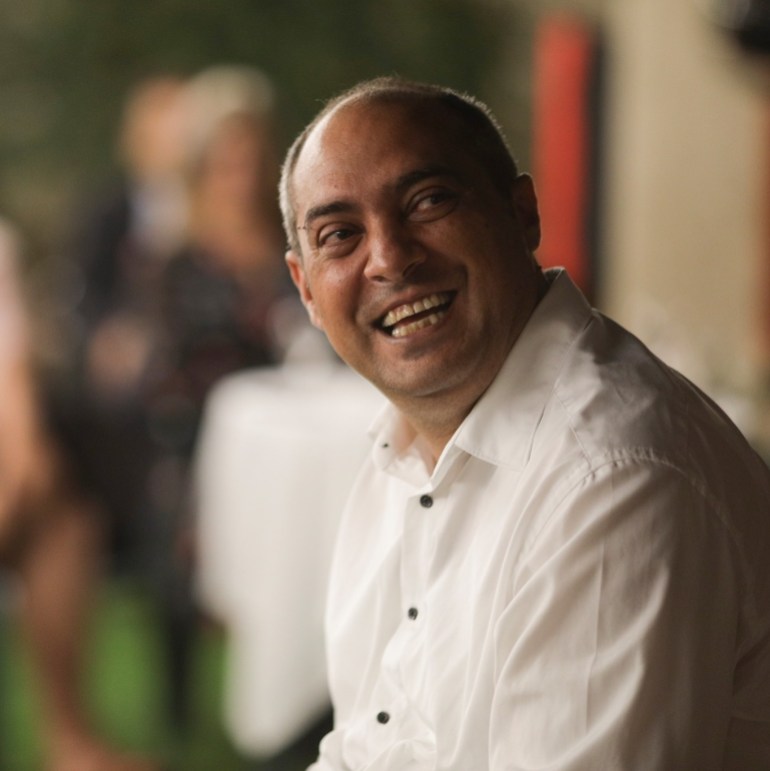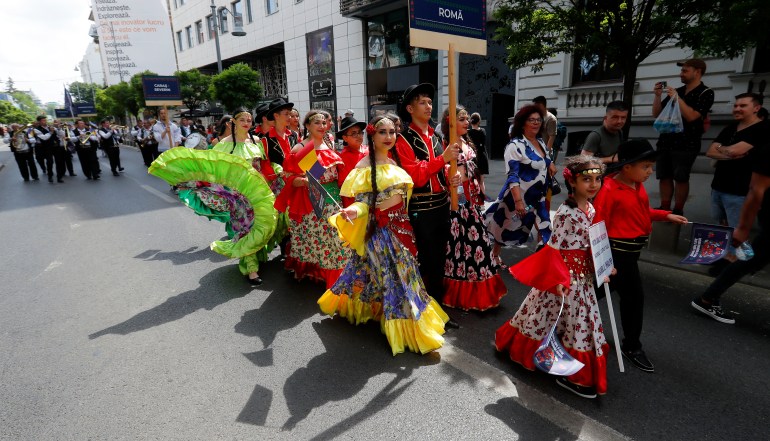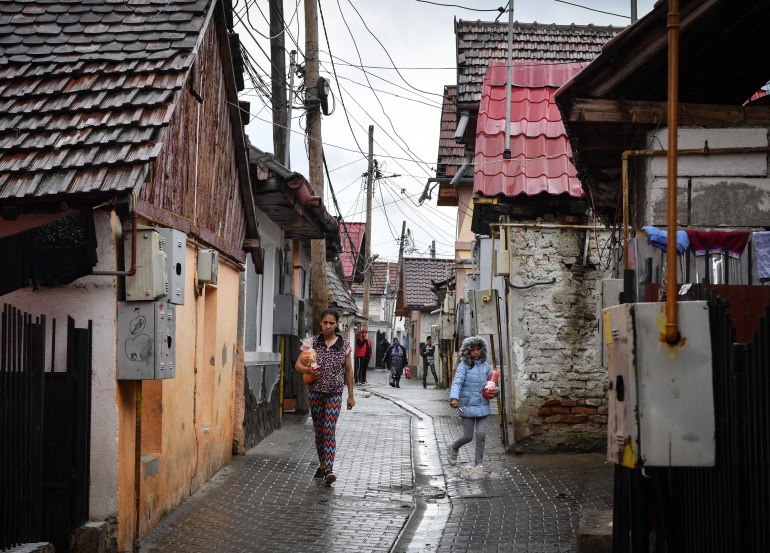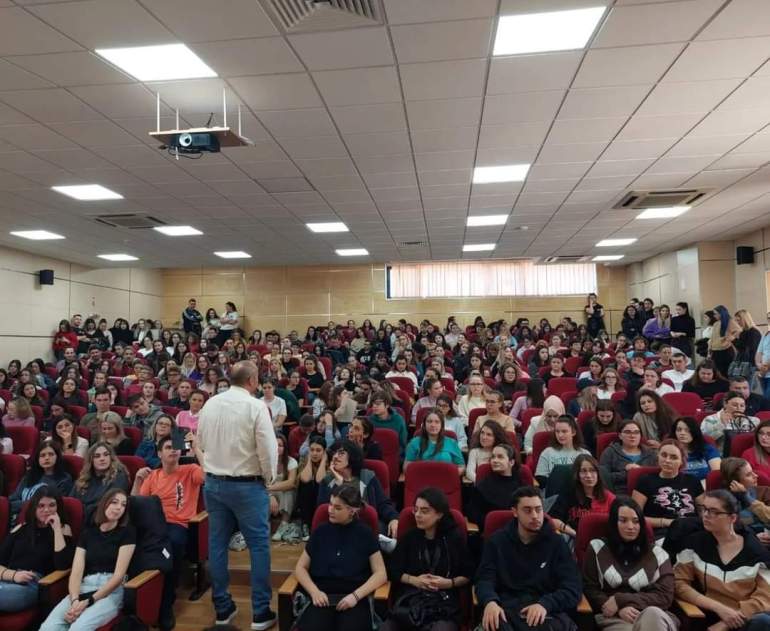The strongest memory Gelu Duminică has from his fieldwork as a sociology student in Romania is the smell of burned human flesh. “There were bloody times back then, in the ‘90s and early 2000s, after the fall of communism,” he says. “People were setting each other on fire. Literally. Many people (whether through tensions between Romanian and Hungarians, Romanian and Roma, or Hungarian and Roma) died in interethnic conflicts.”
Duminică, 46, is one of the leading voices for the Roma cause in Romania. He is a man with a warm voice and a sparkling, deep regard for the subject he knows so well and so personally.
Much of his journey begins with his grandfather, who was fighting for Romania on the Eastern Front during World War II. While he was risking his life to defend his country, his country was busy deporting his Roma family during the Romani Holocaust. Of the 40 members of the family pushed out, only two returned home – one was Duminică’s father.
The Romani Holocaust involved the forced deportation of 25,000 Romani people to Transnistria, a region under Romanian control at the time. Records show that nearly half were children and, tragically, more than 11,000 lost their lives to severe hunger, extreme cold and the deadly typhus epidemic.
Duminică was born in the latter part of the 1970s into crushing poverty and sporadic domestic violence in the city of Galați in eastern Romania. His father had lost his own parents to the Romani Holocaust at the age of three, and turned to begging. Duminică often says that when two states of poverty – his mother’s and father’s – came together, the result was even greater poverty for everyone. The family’s first home was a stable.
You cannot ask someone to change their behaviour without offering them some understanding and knowledge so they can confront their own demons
There were five sons, with Duminică born nine months and 10 days after an older brother had succumbed to leukaemia. His parents, in a desperate bid to save their son, had dismantled their house and sold the bricks to pay for medical treatment.
No one in Duminică’s community had made it to high school before he went, at the insistence of his mother. For most, the highest aspiration was to collect bird feathers for a local bedding and pillow company, a job that was considered clean and easy compared with other occupations: sewage work, street cleaning, digging ditches and working on construction sites.
Life for the Roma community has improved little since then. Studies show 20 percent of Roma children are not enrolled in primary school. Eight in 10 leave school early.
According to the 2022 census, 3.4 percent of Romania’s population is of Roma ethnicity (570,000). But unofficial estimates tell a different story: Romania is, in fact, home to between 1.2 and 1.5 million Roma, many of whom don’t declare their ethnicity for fear of stigma.
From segregation and discrimination to bullying in schools, experts agree, the Romanian state has failed to improve conditions since 2001, when the government published its first “strategy” to improve conditions for Roma communities during its accession to the European Union.
After high school, Duminică studied sociology and social work at the University of Bucharest, eventually becoming an associate professor and executive director of Agenția Împreună, an NGO focused on Roma social inclusion. Over the past two decades, he has participated in more than 50 projects aimed at improving life in disadvantaged areas in Romania.
In 2011, he successfully fought for a revision of the definitions of the terms “gypsy” (țigan) and “Roma” in the dictionary. He argued that the existing explanations perpetuated negative stereotypes by failing to acknowledge that the term “gypsy” is used in a derogatory way.

You often say that social change doesn’t happen overnight, but do you see improvements in Romanian society for Roma communities?
In the first decade and a half after the fall of communism, in the ’90s and early 2000s, there were serious interethnic conflicts. The most famous such conflict is probably the Hădăreni riots, in 1993.
During that period, you would look at job listings and see statements like: “We’re hiring. Roma excluded.” Even erotic hotlines would specify: “8989, I am hot. No Roma.”
Back then, things that now shock people were considered normal. As a Roma person, you were often not allowed to enter clubs or public spaces. There were police beatings in Roma communities. During the Mineriad [when initially peaceful demonstrations by students and opposers of the newly elected government in 1990, straight after the fall of communism, turned violent], for instance, more than 700 out of around 1,300 hostages taken [by Jiu Valley miners following orders from the new president] in Bucharest between June 13 and 15, 1990, were Roma.
Looking only at these issues, one can see significant improvements. It is worth noting that back then, all of these discriminatory actions and attitudes had the support of civil and political societies. Nowadays, if someone is denied access to a public space based on ethnic grounds, that company or institution will be in trouble. This was not the case at the time. If you actually look at all forms of bullying or discrimination, you see a big evolution. Yes, we are far from where we could be, but at the same time, we are also far from where we started.
What are some examples of effective efforts made so far in this direction?
I remember when we started in 2011, the battle to change the term “țigan” (gypsy) in the dictionary. We noticed that the term “rom” (Roma) was synonymous with “țigan,” and among the definitions, there was “a person with bad habits”, without mentioning it having a pejorative connotation. I wrote about the stigmatisation of Roma in the mere dictionary definitions. I can say that the press was super supportive. If I had done this in the ’90s, I would have faced severe backlash.
Resistance to change is natural and, indeed, change doesn’t happen overnight. You need understanding and information. You cannot ask someone to change their behaviour without offering them some understanding and knowledge so they can confront their own demons.
What has Romanian society done to foster this change?
I believe that the improvement we are seeing is mainly due to civil society. It is also true that the internet has fundamentally changed the social landscape, spreading information to as many people as possible in a friendly way. New voices emerged that began to gain traction, voices that dug into the past and provided well-argued truths.
Yet, we have not fared well in terms of education. For instance, we’ve only recently started to learn about Roma slavery [the 500 years of Roma slavery within Romania is considered one of the longest enslavement periods in human history]. Of course, if you talked about the Holocaust in the ’90s, people would have looked at you with disdain. All forms of communication have contributed to social change: music, history, the media. Major media outlets like the BBC came and trained journalists, teaching them a different way of doing things.
Certainly, we are far behind the West, but they have been a democracy and held such reflections for hundreds of years, whereas we have only just started. We are a young society. We’ve been talking about a Romanian society in the last 150 years, and about a “national ethos”, for about 100 years. About democracy, only in the last 30 years, since we were under dictatorships throughout the 20th century.

From your experience as an activist, what do you think is still needed to combat racism in Romania?
I think we need to negotiate some of society’s values, and I mean humanistic values such as “do not judge a book by its cover”. Do not judge people before you know what they do. In other words, judge them based on their actions, not on what YOU think they are doing. The problem is that we are culturally programmed to react in one way or another and, by “culture”, I mean everything that has been passed down to us non-genetically.
And we’ve been culturally fed all sorts of nonsense. The strangers in our childhood stories were never good people – they always came to take our land, water and women. The Black man in the story was always the villain. As a child, you need to behave, otherwise, “the gypsy man will come and kidnap you”.
Steps towards change need to be supported by policies, concrete actions and resources, but before anything else, we need to reach a consensus on values. I also believe that we need leaders. Authentic leaders who put their money where their mouth is.
Over the past decade, we have witnessed the emergence of a new wave of Roma activists and intellectuals. How is this changing the landscape?
I would not call it a wave, but rather a small current. To talk about a wave, you need at least 5,000 such people. However, the people you’re thinking of only belong to civil society; in the political and religious spheres, there is nobody.
If you look closer at all these people, although remarkable, you will notice they are all very individualistic in their work. They are mostly centred on their own stories (see writer Rowena Marin and her book, Who Am I in this World?) publishing books (such as Valeriu Nicolae’s We are the Roma), conducting academic research on discrimination (such as Harvard’s Margareta Matache), directing films and plays (Alina Șerban, Gypsy Queen), or leading NGOs dedicated to the Roma cause. Whereas leaders are followed by the masses. For significant change, leaders are needed. We do not have them yet.
It is true, they contribute significantly to the representation of Roma identity in the public space, which is relatively new. It is new because, after the interethnic conflicts we talked about, the main fight was for rights. In fact, in the times after communism fell, the whole of Romanian society was focused on collective rights and economic development. The Holocaust, slavery and individual rights were too distant from immediate interests.
But this complex Roma identity, which is not subsumed to the idea that a Roma is equal to being poor and discriminated against, began to be discussed only in recent years. We are still at the very beginning.

Could highlighting Roma people who are building lives that are at least ‘normal’ possibly shift the traditional narrative in which Roma are, at best, victims?
I do think life-storying helps. The problem is that we have been taught to see Roma only as bad. A fully functional and integrated Roma citizen is, anyway, not perceived as Roma. Romanians come into daily contact with many Roma people – bread sellers, taxi drivers, bus drivers, teachers – but are not aware of that, because those people do not exhibit a behaviour that’s associated with “Roma”. Instead, we are programmed to believe that all beggars are Roma, as are all thieves and convicts.
What these stories could do, although they do not yet, is provide role models. The biggest challenge with these stories would be for you, a Romanian ethnic woman, to have a Roma woman as a role model. To see yourself in her. In other words, her ethnicity [becomes] so insignificant in terms of her life story that even you can find yourself in it.
One of the reasons I talk a lot about my childhood and my family is precisely to show that I was not much different from others. My story is not an ethnic one. If you see an ethnic story, there’s a problem.
The episodes of violence in my family do not reveal my father beating my mother “in a gypsy fashion”. He just beat her. Many families have gone through a similar story and a person who can see that understands that there’s nothing different.
The strangers in our childhood stories were never good people – as a child, you need to behave, otherwise, ‘the gypsy man will come and kidnap you’
How do my life struggles differ from those of someone who grew up in a disadvantaged family? Maybe they didn’t carry the Roma label, but that of a poor peasant or a physically challenged one. It is true that my Roma label made me suffer from “multiple discrimination”, as theory calls it, but the principle is the same.
The stories that I and other Roma tell are universal stories, not ethnic ones. Of course, intentionally or not, we are also Roma, and that was a double disadvantage.
That’s why you do not see success stories of wealthy Roma – who do exist and who, because of their ethnic label, had it tough their whole lives. You generally see only poor Roma, who struggled and worked, but you’ll notice that the major challenges were economic, only thickened by their ethnic identity.
What motivates you to continue fighting discrimination? How do you find the necessary patience and resilience?
Here, you start with a wrong assumption, which is that I am fighting against discrimination. This society will look how we make it look. I am tired of pointing fingers; it is time to focus on what I can do differently to make things better.
The question is how I can get those around me to understand the need for change so that we can all be better off. More directly, so that I can be better off. Because everything I do, I do out of deep selfishness: I want me, my family, my daughter and my grandchildren to be better off. I want my Romania to look good – not yours, not ours. Because if my Romania looks good, I will feel good, emotionally and mentally productive, I will have self-esteem and everything Maslow’s pyramid talks about [a sociological model representing a hierarchy of human needs, with physiological needs as the foundation and self-actualisation at the top].
If I have that, and you have that, there are already more of us who have it. I am glad that more people relate to my selfish work. Yet, I work based on values. I believe this is what we need more of. We have too many saviours and too few egoists. When you work for your own good you are motivated.
What should I do when my daughter grows up and is called a “crow” by Romanians, and “washed up” by the Roma [a derogatory term used in this context by members of the Roma community for Roma people with a skin colour that is considered lighter than “it should be”]? What could I tell her? Buy her a toy? By no means. This is the reason I do what I do – so that I can look her in the eyes and say: “My dear, I did the best I could. Be smarter than me and do more if you can. That’s why I raised you to care.”
I do not agree with being labelled an activist. It is about positioning, about not wanting to look away. I am just a person who cares and realises that the country will look the way I make it look.

[Courtesy of Gelu Duminică]
Do you think your daughter will grow up in a more open society?
I do everything I can to make that happen. I have every hope that this will happen, but I, myself, want to live in a better country. As I was saying in the beginning, I believe I live in a better country than it was 30 years ago. But I have not just sat and watched the country evolve to be better. How can it be better if we all wait for others to do something?
How do you see your role as a professor in educating people about discrimination against the Roma?
I chose not to be a tenured faculty member. Tenured would mean being at the university’s disposal and not always doing what I want. I have been an associate professor for 12 years. Often, the university pay doesn’t even cover the gas bill.
But I do this because I learn so much from these young people. I am privileged to see how these people change, how knowledge opens minds and hearts, and I receive a lot of energy. It is a privilege, a joy to be with them. A professor should not just deliver the material; that’s what AI can do. The great feat is to emotionally stimulate students so they keep learning even after you leave class. If you achieve that, then you are a true professor. And if the students come to your classes willingly. The attendance in my class is over 90 percent. I believe students come because they find something more than just information. Many of my current colleagues are former students of mine, and I take pride in that.
Next week, I have a class on taraf music [a genre of folk music traditionally played by Roma people] and for this class, the room is usually packed.
When the Roma anthem sounds and the room stands up unprompted, it sends shivers down your spine. Witnessing 300 students stand up while listening to the anthem of a minority, you know you really did something.
In Ukraine, Roma refugees were reportedly discriminated against as they tried to flee war. At the same time, Roma men joined the war effort. Now that the war feels closer in Romania, what does all of this tell us?
Behaviour depends on the context and situation. My grandfather fought on the Eastern Front in the second world war for Romania. While he was fighting at the Dom river, the Romanian government was deporting his family. He was asked to defend the country that was destroying his family, and of the 40 people deported in that group, only two returned home. One of them was my father, who was only three years old at the time.
I am convinced that if the conflict were to expand in Romania, some Roma would be labelled as such [discriminated against as happened in Ukraine]. Because this happens in any possible field.
This post was originally published on this site be sure to check out more of their content.








